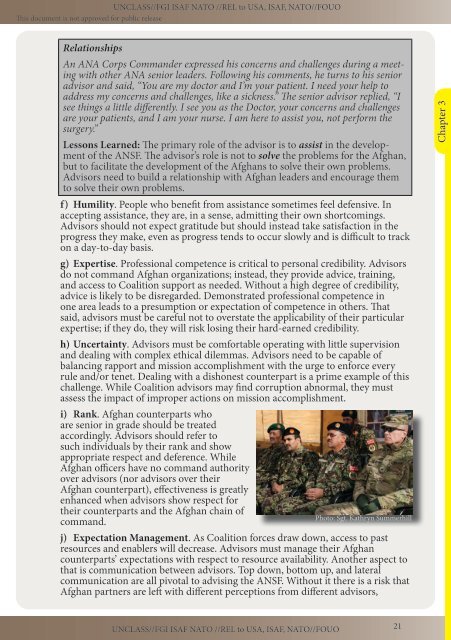20140927_NIU_CJ7_TREX_SFA guide 3.1
20140927_NIU_CJ7_TREX_SFA guide 3.1
20140927_NIU_CJ7_TREX_SFA guide 3.1
Create successful ePaper yourself
Turn your PDF publications into a flip-book with our unique Google optimized e-Paper software.
UNCLASS//FGI ISAF NATO //REL to USA, ISAF, NATO//FOUO<br />
This document is not approved for public release<br />
Relationships<br />
An ANA Corps Commander expressed his concerns and challenges during a meeting<br />
with other ANA senior leaders. Following his comments, he turns to his senior<br />
advisor and said, “You are my doctor and I’m your patient. I need your help to<br />
address my concerns and challenges, like a sickness.” The senior advisor replied, “I<br />
see things a little differently. I see you as the Doctor, your concerns and challenges<br />
are your patients, and I am your nurse. I am here to assist you, not perform the<br />
surgery.”<br />
Lessons Learned: The primary role of the advisor is to assist in the development<br />
of the ANSF. The advisor’s role is not to solve the problems for the Afghan,<br />
but to facilitate the development of the Afghans to solve their own problems.<br />
Advisors need to build a relationship with Afghan leaders and encourage them<br />
to solve their own problems.<br />
f) Humility. People who benefit from assistance sometimes feel defensive. In<br />
accepting assistance, they are, in a sense, admitting their own shortcomings.<br />
Advisors should not expect gratitude but should instead take satisfaction in the<br />
progress they make, even as progress tends to occur slowly and is difficult to track<br />
on a day-to-day basis.<br />
g) Expertise. Professional competence is critical to personal credibility. Advisors<br />
do not command Afghan organizations; instead, they provide advice, training,<br />
and access to Coalition support as needed. Without a high degree of credibility,<br />
advice is likely to be disregarded. Demonstrated professional competence in<br />
one area leads to a presumption or expectation of competence in others. That<br />
said, advisors must be careful not to overstate the applicability of their particular<br />
expertise; if they do, they will risk losing their hard-earned credibility.<br />
h) Uncertainty. Advisors must be comfortable operating with little supervision<br />
and dealing with complex ethical dilemmas. Advisors need to be capable of<br />
balancing rapport and mission accomplishment with the urge to enforce every<br />
rule and/or tenet. Dealing with a dishonest counterpart is a prime example of this<br />
challenge. While Coalition advisors may find corruption abnormal, they must<br />
assess the impact of improper actions on mission accomplishment.<br />
i) Rank. Afghan counterparts who<br />
are senior in grade should be treated<br />
accordingly. Advisors should refer to<br />
such individuals by their rank and show<br />
appropriate respect and deference. While<br />
Afghan officers have no command authority<br />
over advisors (nor advisors over their<br />
Afghan counterpart), effectiveness is greatly<br />
enhanced when advisors show respect for<br />
their counterparts and the Afghan chain of<br />
Photo: Sgt. Kathryn Summerhill<br />
command.<br />
j) Expectation Management. As Coalition forces draw down, access to past<br />
resources and enablers will decrease. Advisors must manage their Afghan<br />
counterparts’ expectations with respect to resource availability. Another aspect to<br />
that is communication between advisors. Top down, bottom up, and lateral<br />
communication are all pivotal to advising the ANSF. Without it there is a risk that<br />
Afghan partners are left with different perceptions from different advisors,<br />
Chapter 3<br />
UNCLASS//FGI ISAF NATO //REL to USA, ISAF, NATO//FOUO<br />
21


